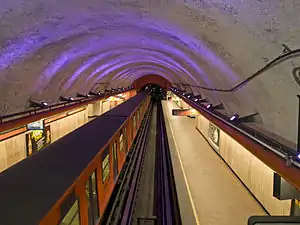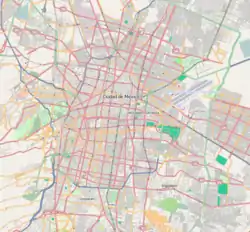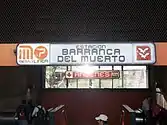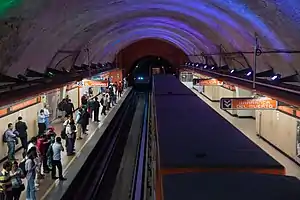| STC rapid transit | ||||||||||||||||||||||||||||||||||||||||||||||||||||||||||||||||||||||||||||||||||||||||||||||||||||||||||||||||||||||||
 Station platforms | ||||||||||||||||||||||||||||||||||||||||||||||||||||||||||||||||||||||||||||||||||||||||||||||||||||||||||||||||||||||||
| General information | ||||||||||||||||||||||||||||||||||||||||||||||||||||||||||||||||||||||||||||||||||||||||||||||||||||||||||||||||||||||||
| Location | Avenida Revolución Los Alpes, Álvaro Obregón Mexico City Mexico | |||||||||||||||||||||||||||||||||||||||||||||||||||||||||||||||||||||||||||||||||||||||||||||||||||||||||||||||||||||||
| Coordinates | 19°21′38″N 99°11′25″W / 19.360648°N 99.190149°W | |||||||||||||||||||||||||||||||||||||||||||||||||||||||||||||||||||||||||||||||||||||||||||||||||||||||||||||||||||||||
| Operated by | Sistema de Transporte Colectivo (STC) | |||||||||||||||||||||||||||||||||||||||||||||||||||||||||||||||||||||||||||||||||||||||||||||||||||||||||||||||||||||||
| Line(s) | ||||||||||||||||||||||||||||||||||||||||||||||||||||||||||||||||||||||||||||||||||||||||||||||||||||||||||||||||||||||||
| Platforms | 2 side platforms | |||||||||||||||||||||||||||||||||||||||||||||||||||||||||||||||||||||||||||||||||||||||||||||||||||||||||||||||||||||||
| Tracks | 2 | |||||||||||||||||||||||||||||||||||||||||||||||||||||||||||||||||||||||||||||||||||||||||||||||||||||||||||||||||||||||
| Construction | ||||||||||||||||||||||||||||||||||||||||||||||||||||||||||||||||||||||||||||||||||||||||||||||||||||||||||||||||||||||||
| Structure type | Underground | |||||||||||||||||||||||||||||||||||||||||||||||||||||||||||||||||||||||||||||||||||||||||||||||||||||||||||||||||||||||
| Platform levels | 1 | |||||||||||||||||||||||||||||||||||||||||||||||||||||||||||||||||||||||||||||||||||||||||||||||||||||||||||||||||||||||
| Parking | No | |||||||||||||||||||||||||||||||||||||||||||||||||||||||||||||||||||||||||||||||||||||||||||||||||||||||||||||||||||||||
| Bicycle facilities | No | |||||||||||||||||||||||||||||||||||||||||||||||||||||||||||||||||||||||||||||||||||||||||||||||||||||||||||||||||||||||
| Accessible | Partial | |||||||||||||||||||||||||||||||||||||||||||||||||||||||||||||||||||||||||||||||||||||||||||||||||||||||||||||||||||||||
| Other information | ||||||||||||||||||||||||||||||||||||||||||||||||||||||||||||||||||||||||||||||||||||||||||||||||||||||||||||||||||||||||
| Status | In service | |||||||||||||||||||||||||||||||||||||||||||||||||||||||||||||||||||||||||||||||||||||||||||||||||||||||||||||||||||||||
| History | ||||||||||||||||||||||||||||||||||||||||||||||||||||||||||||||||||||||||||||||||||||||||||||||||||||||||||||||||||||||||
| Opened | 19 December 1985 | |||||||||||||||||||||||||||||||||||||||||||||||||||||||||||||||||||||||||||||||||||||||||||||||||||||||||||||||||||||||
| Passengers | ||||||||||||||||||||||||||||||||||||||||||||||||||||||||||||||||||||||||||||||||||||||||||||||||||||||||||||||||||||||||
| 2022 | 8,739,839[1] | |||||||||||||||||||||||||||||||||||||||||||||||||||||||||||||||||||||||||||||||||||||||||||||||||||||||||||||||||||||||
| Rank | 27/195[1] | |||||||||||||||||||||||||||||||||||||||||||||||||||||||||||||||||||||||||||||||||||||||||||||||||||||||||||||||||||||||
| Services | ||||||||||||||||||||||||||||||||||||||||||||||||||||||||||||||||||||||||||||||||||||||||||||||||||||||||||||||||||||||||
| ||||||||||||||||||||||||||||||||||||||||||||||||||||||||||||||||||||||||||||||||||||||||||||||||||||||||||||||||||||||||
| ||||||||||||||||||||||||||||||||||||||||||||||||||||||||||||||||||||||||||||||||||||||||||||||||||||||||||||||||||||||||
| Location | ||||||||||||||||||||||||||||||||||||||||||||||||||||||||||||||||||||||||||||||||||||||||||||||||||||||||||||||||||||||||
 Location within Mexico City | ||||||||||||||||||||||||||||||||||||||||||||||||||||||||||||||||||||||||||||||||||||||||||||||||||||||||||||||||||||||||
| Area map | ||||||||||||||||||||||||||||||||||||||||||||||||||||||||||||||||||||||||||||||||||||||||||||||||||||||||||||||||||||||||
Barranca del Muerto is the southern terminus of Line 7 of the Mexico City Metro. It is located in the Álvaro Obregón borough. In 2019, the station had an average ridership of 45,703 passengers per day, making it the busiest station in Line 7.[2]
Name and pictogram
The metro station is named after Avenida Barranca del Muerto, which was once a big depression, the same length as the actual avenue (barranca means gully or ravine). During the Mexican Revolution (1910–1921) this was a place where revolutionary soldiers dropped many corpses. Eagles and buzzards flew nearby, smelling rotten flesh. Popular imagination refers to the dead people's souls and ghosts restlessly promenading near that big hole. Thus, Barranca del Muerto means "Canyon of the Dead".[3]
The station's pictogram depicts two eagles, some say buzzards.[3]
History
Metro Barranca del Muerto was opened on 19 December 1985 together with the whole 5 kilometres (3.1 mi) long extension stretch of Line 7 from Tacubaya.[4]
This station was supposed to be a provisional terminal. According to original plans, Line 7 would be extended south and reach as far as San Jerónimo. Nevertheless, such plans never materialized and Barranca del Muerto has been Line 7 southern terminus since.[5]
Recently, in 2017, mayors from the Álvaro Obregón and Magdalena Contreras municipalities, have asked Mexico City's government to pick up the project again and continue with the southern expansion of the line to San Jerónimo, that would benefit around 500,000 inhabitants of both municipalities.[6]
General information
Metro Barranca del Muerto is located at the intersection of Avenida Revolución and Avenida Barranca del Muerto, on the border of the Álvaro Obregón and Benito Juárez municipalities.[3]
The station has two separated platforms, one used for arriving trains and another one for departing trains. The exit is at the middle of the platforms. There are two exits, located at the intersection of Avenida Revolución (which leads further to San Ángel), Macedonio Alcala, and Calle Alfonso Caso.
South of Barranca del Muerto, there is a Saturday market at the famous San Jacinto square (Bazar de los sábados de San Jacinto) where artists sell paintings, plants and other handcrafts.[7][8]
Metro Barranca del Muerto, like many stations in the Metro network, has a cyber center, where users can access internet through a computer; the service is free. The station also has a cultural display and the sculptural mural Visión del Mictlán by Luis Y. Aragón, which is located right outside the east access to the station.[3]
The station serves the Guadalupe Inn and Los Alpes neighborhoods.
Ridership
| Annual passenger ridership | |||||
|---|---|---|---|---|---|
| Year | Ridership | Average daily | Rank | % change | Ref. |
| 2022 | 8,739,839 | 23,944 | 27/195 | +19.21% | [1] |
| 2021 | 7,331,623 | 20,086 | 23/195 | −11.01% | [9] |
| 2020 | 8,238,512 | 22,509 | 21/195 | −50.61% | [10] |
| 2019 | 16,681,529 | 45,702 | 19/195 | +3.71% | [11] |
| 2018 | 16,085,373 | 44,069 | 19/195 | +6.68% | [12] |
| 2017 | 15,078,243 | 41,310 | 21/195 | +3.93% | [13] |
| 2016 | 14,508,378 | 39,640 | 21/195 | +5.94% | [14] |
| 2015 | 13,694,853 | 37,520 | 25/195 | +3.11% | [15] |
| 2014 | 13,282,149 | 36,389 | 27/195 | −3.77% | [16] |
| 2013 | 13,802,760 | 37,815 | 26/195 | +15.81% | [17] |
| 2012 | 11,918,034 | 32,562 | 34/195 | −19.00% | [18] |
| 2011 | 14,713,409 | 40,310 | 24/175 | +25.98% | [19] |
| 2010 | 11,678,844 | 31,996 | 31/175 | – | [20] |
Exits
- West: Av. Revolución and Condor, Col. Los Alpes
- East: Av. Revolución and Gustavo Campa, Col. Guadalupe Inn
Station layout
| G | Street Level | Exit/Entrance |
| B1 | Mezzanine | Ticket windows/Fare control |
| B2 | Side platform, doors will open on the left | |
| Northbound | | |
| Southbound | ← | |
| Side platform, doors will open on the right | ||
Gallery
 Entrance to the station
Entrance to the station Platforms
Platforms
References
- 1 2 3 "Afluencia de estación por línea 2022" [Station traffic per line 2022] (in Spanish). Sistema Transporte Colectivo Metro. 2023. Archived from the original on 5 March 2023. Retrieved 5 March 2023.
- ↑ "Estaciones de mayor afluencia 2019" (in Spanish). Metro CDMX. Retrieved 29 March 2020.
- 1 2 3 4 "Barranca del Muerto" (in Spanish). Metro CDMX. Retrieved 29 March 2020.
- ↑ Schwandl, Robert. "Opening Dates for Mexico City's Subway". Urbanrail. Retrieved 13 September 2014.
- ↑ "El plan maestro del Metro que nunca se llevó a cabo". mxcity.mx (in Spanish). Retrieved 29 March 2020.
- ↑ Suárez, Gerardo (1 March 2017). "Mercado pide ampliar L7 del Metro hasta San Jerónimo". El Universal (in Spanish). Retrieved 29 March 2020.
- ↑ "Bazar del Sábado - Ciudad de México". Retrieved 1 August 2011.
- ↑ "San Ángel Saturday Bazaar and Art Fair Centro de San Ángel". Retrieved 1 August 2011.
- ↑ "Afluencia de estación por línea 2021" [Station traffic per line 2021] (in Spanish). Sistema Transporte Colectivo Metro. 2020. Archived from the original on 7 March 2022. Retrieved 7 March 2022.
- ↑ "Afluencia de estación por línea 2020" [Station traffic per line 2020] (in Spanish). Sistema Transporte Colectivo Metro. 2021. Archived from the original on 21 June 2021. Retrieved 21 June 2021.
- ↑ "Afluencia de estación por línea 2019" [Station traffic per line 2019] (in Spanish). Sistema Transporte Colectivo Metro. 2020. Archived from the original on 8 April 2020. Retrieved 3 May 2020.
- ↑ "Afluencia de estación por línea 2018" [Station traffic per line 2018] (in Spanish). Sistema Transporte Colectivo Metro. 2019. Archived from the original on 6 June 2019. Retrieved 7 April 2020.
- ↑ "Afluencia de estación por línea 2017" [Station traffic per line 2017] (in Spanish). Sistema Transporte Colectivo Metro. 2019. Archived from the original on 3 May 2020. Retrieved 3 May 2020.
- ↑ "Afluencia de estación por línea 2016" [Station traffic per line 2016] (in Spanish). Sistema Transporte Colectivo Metro. 2017. Archived from the original on 3 May 2020. Retrieved 3 May 2020.
- ↑ "Afluencia de estación por línea 2015" [Station traffic per line 2015] (in Spanish). Sistema Transporte Colectivo Metro. 2016. Archived from the original on 3 May 2020. Retrieved 6 May 2020.
- ↑ "Afluencia de estación por línea 2014" [Station traffic per line 2014] (in Spanish). Sistema Transporte Colectivo Metro. 2015. Archived from the original on 3 May 2020. Retrieved 6 May 2020.
- ↑ "Afluencia de estación por línea 2013" [Station traffic per line 2013] (in Spanish). Sistema Transporte Colectivo Metro. 2014. Archived from the original on 3 May 2020. Retrieved 6 May 2020.
- ↑ "Afluencia de estación por línea 2012" [Station traffic per line 2012] (in Spanish). Sistema Transporte Colectivo Metro. 2013. Archived from the original on 3 May 2020. Retrieved 6 May 2020.
- ↑ "Afluencia de estación por línea 2011" [Station traffic per line 2011] (in Spanish). Sistema Transporte Colectivo Metro. 2012. Archived from the original on 7 May 2020. Retrieved 6 May 2020.
- ↑ "Afluencia de estación por línea 2010" [Station traffic per line 2010] (in Spanish). Sistema Transporte Colectivo Metro. 2011. Archived from the original on 7 May 2020. Retrieved 6 May 2020.